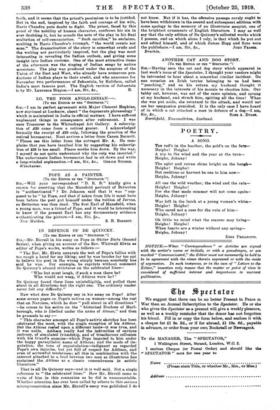IN DEFENCE OF DE QUINCEY.
[To THE EDITOR OP THE " SPECTATOR."1
Ste,—Mr. Birrell in his essay on Pope in Obiter Dicta (Second Series), when giving an account of the Rev. Whitwell Elwin as editor of Pope's works, writes as follows : " The Rev. Mr. Elwin unravels the web of Pope's follies with too rough a hand for my liking; and he was besides far too apt to believe his poet in the wrong simply because somebody has said he was. For example, he reprints without comment De Quincey's absurd strictures on the celebrated lines ' Who but must laugh, if such a man there be? Who would not weep, if Atticus were he?'
De Quincey found these lines unintelligible, and pulled them about in all directions but the right one. The ordinary reader never felt any difficulty."
Now what does De Quincey say in his essay on Pope! After some severe pages on Pope's satires on women—among the rest that on Narcissa, which he does " pull about in all directions " —he comes to his satire on the " historical Duchess of Marlborough, who is libelled under the name of Atossa," and then he proceeds to say: " This character amongst all Pope's satiric sketches has been celebrated the most, with the single exception of his Atticus. But the Atticus rested upon a different basis—it was true, and it was noble. Addison really had the infirmities of envious jealousy, of simulated friendship, and of treacherous collusion with his friend's enemies—which Pope imputed to him under the happy parasyllabic name of Atticus; and the mode of imputation, the tone of expostulation—indignant as regarded Pope's own injuries, but yet full of respect for Addison, and even of sorrowful tenderness; all this in combination with the interest attached to a feud between two men so illustrious has sustained the Atticus as a classic remembrance in satiric literature."
That is all De Quincey says—and it is well said. Not a single reference to " the celebrated lines." How Mr. Birrell came to write of him in this connexion as he did is unaccountable. Whether attention has ever been called by others to this serious misrepresentation since Mr. Birrell's essay was published I do not know. But if it has, the offensive passage surely ought to have been withdrawn in the second and subsequent editions with some apology to the memory of an illustrious essayist, one of the brightest ornaments of English literature. I may as well say that the only edition of De Quinoey's collected works which I possess, and on which alone I rely, is that which he put out and edited himself, and of which James Hogg and Sons were
the publishers.—I am, Sir, he., JOHN FRASER. Brechin.










































 Previous page
Previous page